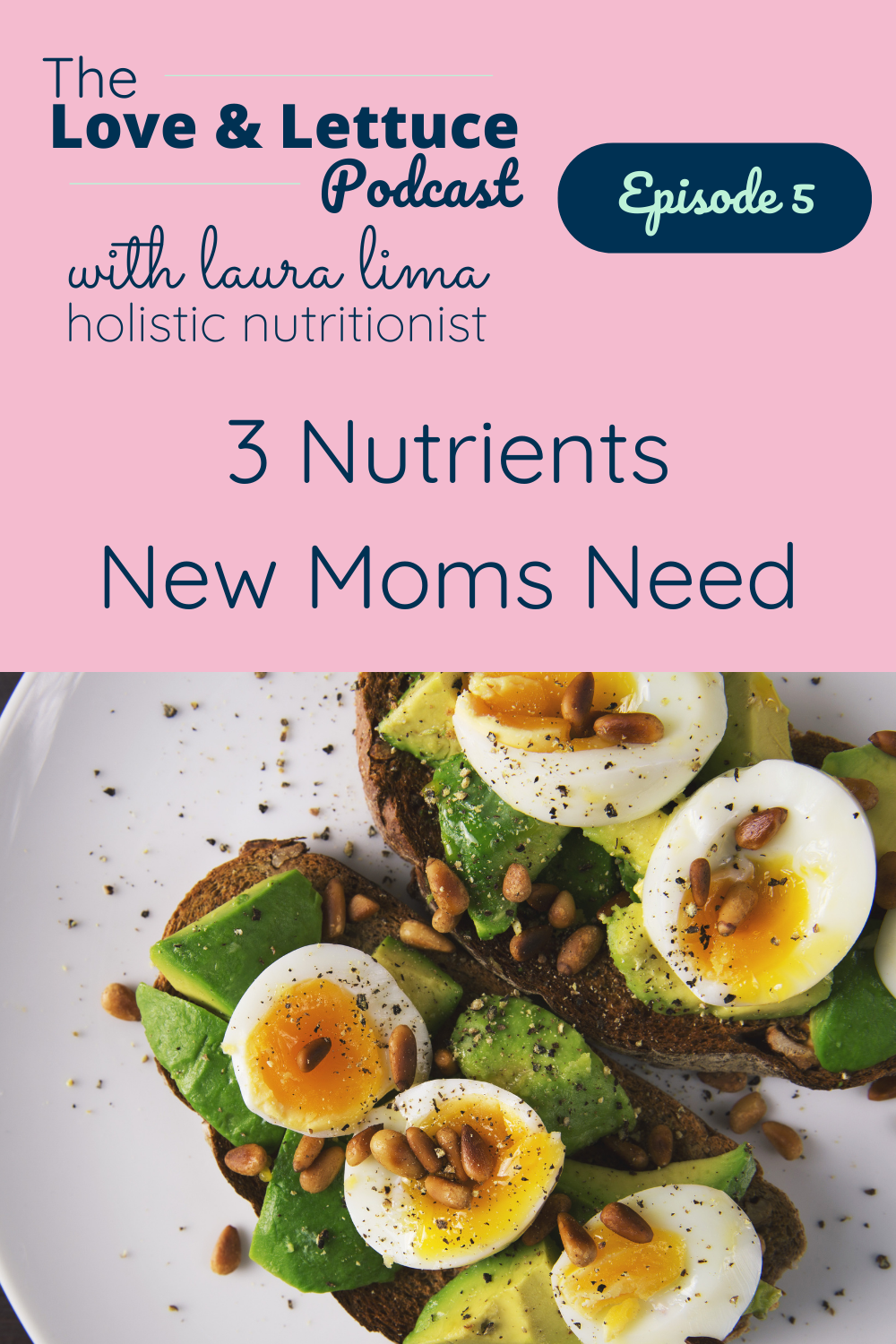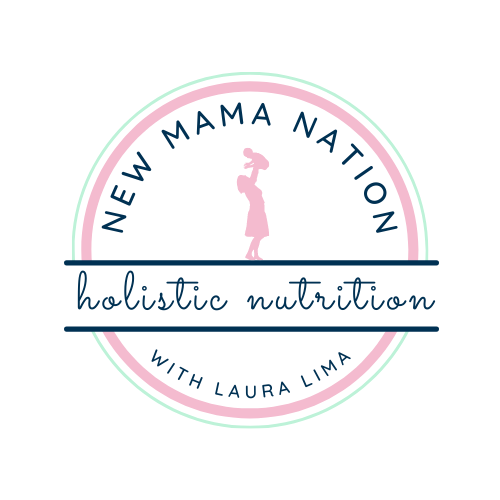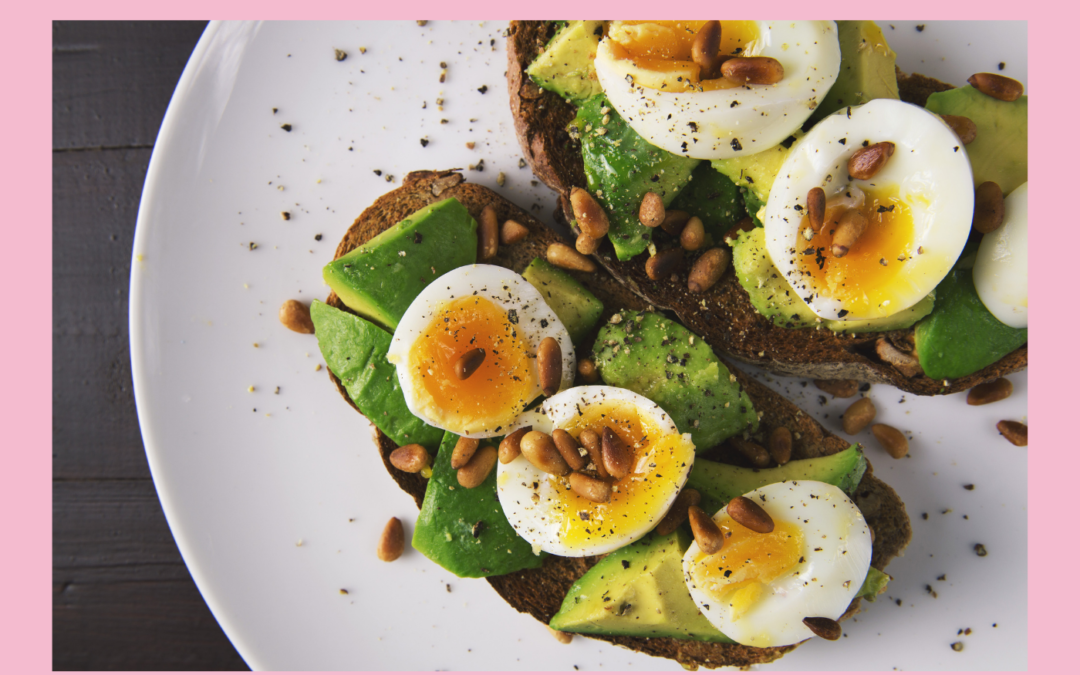Listen on Apple Podcasts: Click here
Links Mentioned
Transcript
You’re listening to The Love & Lettuce Podcast, episode number five. I can’t wait to dive into today’s topic because I’m talking about what foods new moms should be focusing on. There are certain nutrients that are depleted during pregnancy, and that are super important during breastfeeding. And even if you’re not breastfeeding, these nutrients are so essential to help your body recover and replenish. And in my opinion, these nutrients, and the foods that contain them, just aren’t emphasized enough; they’re not talked about hardly at all. So we’re going to do that today. Let’s do this.
Hey, this is Laura Lima, holistic nutritionist and founder of New Mama Nation, and host of The Love & Lettuce Podcast. I am here to help mamas know what to eat to give them energy and help them feel fantastic, so they can better enjoy life with their littles. And remember, this podcast is for educational and informational purposes only, and does not replace medical advice from your healthcare provider, and is not intended to diagnose or treat any medical condition. As always, please consult your healthcare provider to find out what is right for you. With that said, let’s get to the show.
Could you use more energy, mama?
I mean, who couldn’t, right? Get my free New Mama Energy Guide, where I’ll give you 10 tips to increase your energy, stat. Go to bit.ly/newmamas, that’s bit.ly/newmamas, to get your free copy.
I wanna know, is your food intake something you’re thinking about if you’ve just had a baby, or something you thought about when you had a newborn? Did your recovery process as a mom even enter your mind? I mean, I know it’s all about the baby, but it also needs to be about the mother!
No matter if this is your first or fifth baby, you need time to heal, and you need nutrients to nourish and replenish your body.
And there are quite a few nutrients needed, ones that are often depleted during pregnancy, and ones that help your body physically recover and repair, and that help nourish you mentally and emotionally as well.
I can’t wait to cover all of those nutrients in detail, but for today’s episode, I’m going to stick with just three of them. It was so hard to narrow it down! But I’ve chosen these three because literally all mamas need them. So let’s get right into it, shall we?
The first of the nutrients we’re diving into today is … can I get a drumroll please? … thanks. Omega-3!
And specifically, DHA. During pregnancy, DHA helps to build baby’s brain and nervous system, and even their eyes. (And the eyes are really a direct extension of the brain, after all, so it makes sense.) And for mom, DHA is so very vital, not only for our brain and nervous system, and yes, our eyes, our eyesight, but for our mental state as well. Our emotional health, our mood, our prevention of depression.
So how important is that? Am I right? And yet, so much of our DHA is given to baby during pregnancy, which depletes our stores while feeding baby’s. So it’s fantastic in one way, that our body is so brilliant that it prioritizes baby’s health over mom’s. But also, so many of us moms have no idea that we have to replace it, we have to replenish it.
And actually, the same is true for so many nutrients.
I mean, obviously right? The baby’s needs are more important than the mom’s during pregnancy, so the body will use its own stores of nutrients as much as it needs to in order to nourish and protect the growing baby. But again, we need to replenish because then we’re just depleted, and it’s no wonder we’re having all of these symptoms and feeling all of these ways that are not positive and not ideal, because we have to replenish these nutrients that are lost.
Now, let me ask you a question. Have you ever heard of mom brain?
Yeah, of course you have. Mom brain can be due to many different factors (including having a million things to do as a mama, hello!). But low DHA levels can absolutely be involved here. Our brain needs certain nutrients in order to function properly, DHA being one of them. So it makes sense that a deficiency in DHA can cause mom brain, or at least be a huge factor.
And what about postpartum depression?
Again, many things can be at play here, but we can do so much for ourselves in preventing it, or helping ourselves through it, by ensuring adequate DHA intake. Yes, there are many other things as well and we can’t downplay any of them at all. But my point is that with proper, even ideal, DHA levels, those other things, those other practices and methods and things that you can do, are more likely to have a positive effect, to work.
The bottom line is that it’s hard to get anywhere when you haven’t addressed a huge underlying problem, in this case, DHA deficiency.
So no matter what else you’re doing, look there, correct that, and then you know you’ve addressed the foundation. And then, if you’re still feeling low, still feeling depressed, your mood is still all over the place, then you can look at other factors and address those. But you have to have that baseline in place.
I like to get my DHA from food and from a supplement, since it is that important and even with the best diet, honestly, it can be hard to get the amount we need from food alone. Some of these food sources are fish and seafood, as well as eggs, especially pastured eggs (sometimes you’ll also see the term “grass-fed eggs”, or “eggs from grass-fed hens”), and also grass-fed beef.
And as a supplement, fish oil and cod liver oil are fantastic.
Cod liver oil is actually my preferred supplement here, even though it’s actually a traditional food, not really a supplement, but we’ll put it here in the supplement category just for simplicity’s sake. So yeah, cod liver oil I love because it also provides vitamins A and D, two super important nutrients that can be hard to find elsewhere. So it’s always good to get that extra.
Going back to the fish for a second, the best sources are sardines and anchovies. You’re like, yay! Don’t worry if you’re not a fan, but I know some of you are. And also, herring, Atlantic mackerel, and trout. Salmon is also up there as a best source, and this is definitely my favourite in the fish category, for sure. I actually don’t mind sardines either, but I do prefer salmon, for sure. Great seafood sources of DHA include mussels, oysters, and clams.
So overall, awesome DHA sources, just to run through them again, include fish, seafood, eggs (especially the yolks), grass-fed beef, and fish oil or cod liver oil.
Alright, let’s move on to the second of our super important nutrients for new moms. Let’s get that drumroll back because that was fun… vitamin D!
Good ol’ vitamin D. Unfortunately, many of us have to pay to get our vitamin D levels tested, including here in Ontario, where I live. But it isn’t very expensive and is so worth it to know where your level is at.
Now, there are some foods that are great sources, but it can be really hard to get in our diet, and certainly hard to get enough. And considering that 37% of Canadians are vitamin D deficient, with 7.4% being considered severely deficient, oh my goodness, we need to be talking about this right now… so I’m very glad that we are!
With all of this importance of vitamin D in general, you can imagine how essential it is for proper growth and development and overall health of baby during pregnancy, like extremely, vitally essential. And actually, for breastfeeding moms, our vitamin D levels are higher during breastfeeding than they were in pregnancy, in order to ensure sufficient levels in breast milk. Once again, even if you’re not breastfeeding, your needs are still very high.
I encourage you to talk to your doctor to get your levels checked, so that you have a better idea of how much nutrients your body needs.
Really good information to have, for sure. I personally have a tendency toward a low vitamin D level, so I have to be even more careful that I get enough in my diet, and that I take a supplement in addition to my food. And, I aim to get out in the sunshine (without sunblock, since that doesn’t allow for proper vitamin D production through our skin, by the way), I aim to get that sun exposure daily for at least 10 minutes per day.
Vitamin D is beneficial, and required really, in many areas of the body, including our bones, as it helps calcium to be absorbed into our bloodstream, as well as our immune system. Those are two of the really big ones, but so many systems require vitamin D, and certainly for the growing, developing baby, oh my goodness, so very vital.
Food sources of vitamin D.
So that includes things like egg yolks… you’re seeing a pattern here, right? Vitamin D, DHA, egg yolks… liver (I know), fatty fish like salmon, trout, sardines, and also cod liver oil, which, like I said before, is kind of a supplement but kind of a food too, a very traditional one at that. And yeah, you might’ve heard me say “liver” just now. And yeah, I meant it. I’m going to talk about that in a bit, because it doesn’t have to be as gross as you might think. Because I know what you’re thinking, believe me.
Again, if you’re not sure what your vitamin D level is, I highly, highly recommend asking your doctor for a requisition to get yours tested. It doesn’t cost much, if you, like me, have to pay for it, and it is so very valuable to have that information. If your levels are low, adding a vitamin D supplement to your diet is crucial, especially for us new mamas.
Okay, and that brings us to our last nutrient today, but most certainly not least … let’s do the drum roll thing, since it’s now a thing … choline!
Have you even heard of this nutrient? You very well may not have since it’s not talked about as much as the other, more popular nutrients.
Choline isn’t actually a vitamin or mineral, but it’s considered an essential micronutrient. And since it’s similar to B vitamins, it’s often classed together with that family. And just like with vitamin D, our needs are actually higher during breastfeeding than pregnancy, since it is so essential for the development of baby’s brain and memory function as well. In fact, our needs for choline are the highest during breastfeeding than any other stage of life. Isn’t that crazy? That just goes to show how very vital it is. And again, even if you’re not breastfeeding, your needs are still super high. Many traditional cultures rely heavily on eggs in the new mom’s diet, and organ meats and other choline-rich foods. And again, it just goes to show you how important this nutrient is.
So, eggs, specifically egg yolks, are a fantastic source of choline.
So, by the way, vitamin D we talked about today, DHA we talked about, and choline… all super good source… or I should say, eggs are super good source of all three of these nutrients today. Hence, eating so many eggs, as many as you can when you’re a new mom, being so healthy for you.
Anyway, so eggs, specifically egg yolks, are a fantastic source of choline, as is liver. Yes, liver. If you’re like, oh my goodness, that is disgusting, don’t worry, I totally get you. I used to think the exact same too, believe me, so I get it. But knowing how good it is for me and all the nutrients it provides, some of which are pretty hard to find in other foods, makes me want to make an effort to like it. And I actually make a liver pate that is surprisingly tasty, and I have it with crackers. And yeah, it’s quite tolerable and dare I say, enjoyable! You can also hide liver inside certain recipes. So for example, chili, meatloaf, meatballs, tacos… basically, anywhere you’re using ground meat, you can chop it up finely and throw it in. You would seriously never even know it’s there. But making the effort and taking that extra step just gives you so many more nutrients. So it is 100% worth it.
Okay, that was a big aside on liver, but it is well deserving of its own personal aside because of its nutrient status, so there you go.
Another source of choline is lecithin.
Lecithin is like, it comes in these tiny little pellet granule things, and I add mine to my smoothie. The one I get is the organic soy lecithin granules. So so so good for brain and nervous system, and when I put it in my smoothie, you can’t even tell it’s there at all because it doesn’t change the flavour. So I usually throw in about three tablespoons, super easy, and delicious because again, it doesn’t add a flavour, so it tastes like my regular smoothie. And you can also get in pill form, and in that case, I would look for sunflower lecithin. Now other choline sources, food sources include beef, chicken, fish, and dairy.
Okay, so I want to know, mama, have you heard about the importance of these nutrients before? Have you heard of choline? Have you eaten liver? All these things I want to know! Find me on Instagram and let’s chat. I’m @lauraannlima. Take a screenshot of this episode and tag me in your story (or send me a DM) and tell me what you thought. I will see you there.
And if you’re not already subscribed to this podcast, do it!
That way when a new episode comes out, you’ll see it right there on your phone. Talk to you next week.
And don’t forget to get your free copy of my New Mama Energy Guide. Just go to bit.ly/newmamas for instant access.
Thanks for listening to The Love & Lettuce Podcast. To find out how to work with me and for more great info, check out newmamanation.com. This is Laura! Until next time, love and lettuce.


Laura Lima CNP, RNCP
Laura is a holistic nutritionist, stay-at-home mompreneur, wife to Hamilton Realtor, Miguel Lima, and mama to Cutest Babies Ever, Ellie and Maggie. (Ha.) She loves teaching women that focusing on real foods can help them feel fantastic and have more energy so they can take on the many calls of mamahood (and life in general). She spends much of her time in her free Facebook group where she teaches how to do just that. Are you a new(ish) mama? She’d love for you to join her there.

